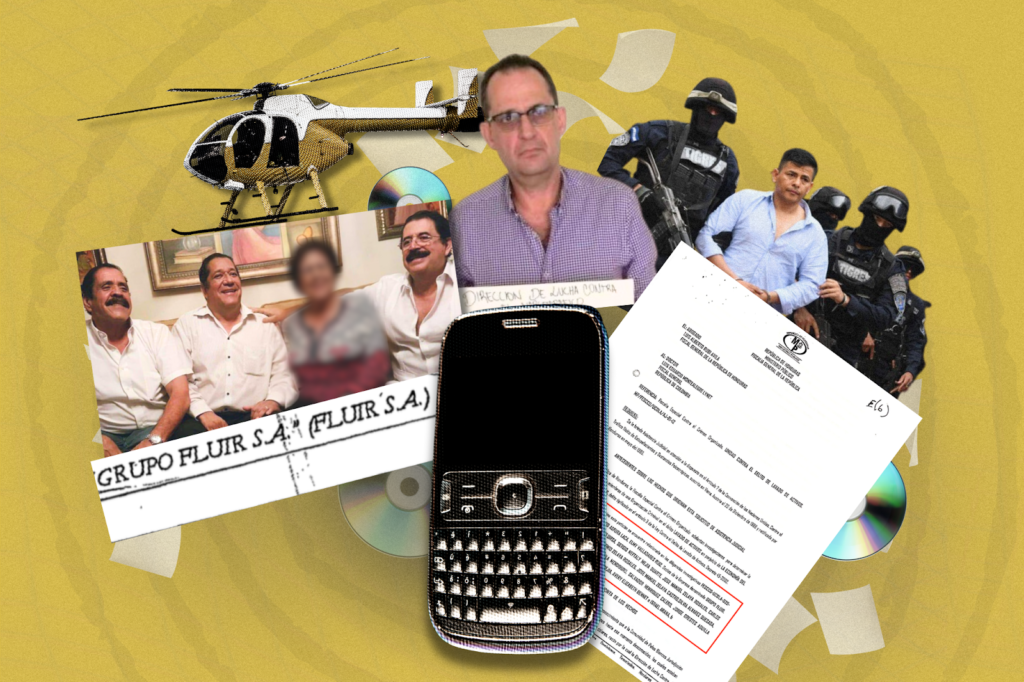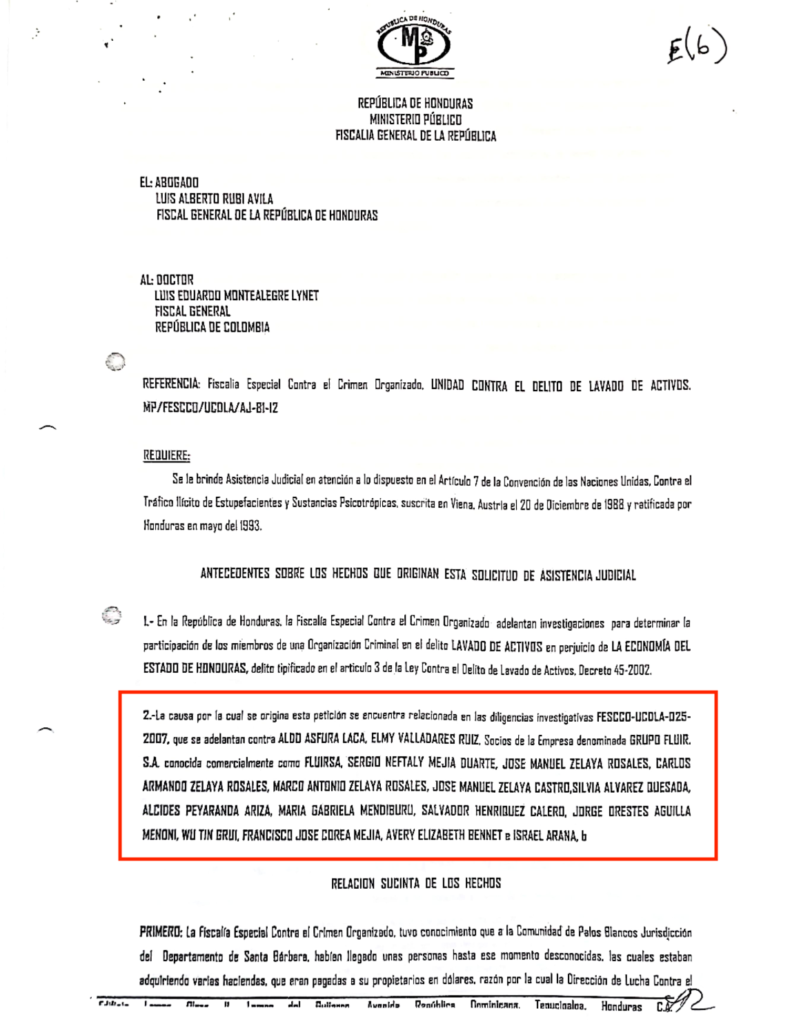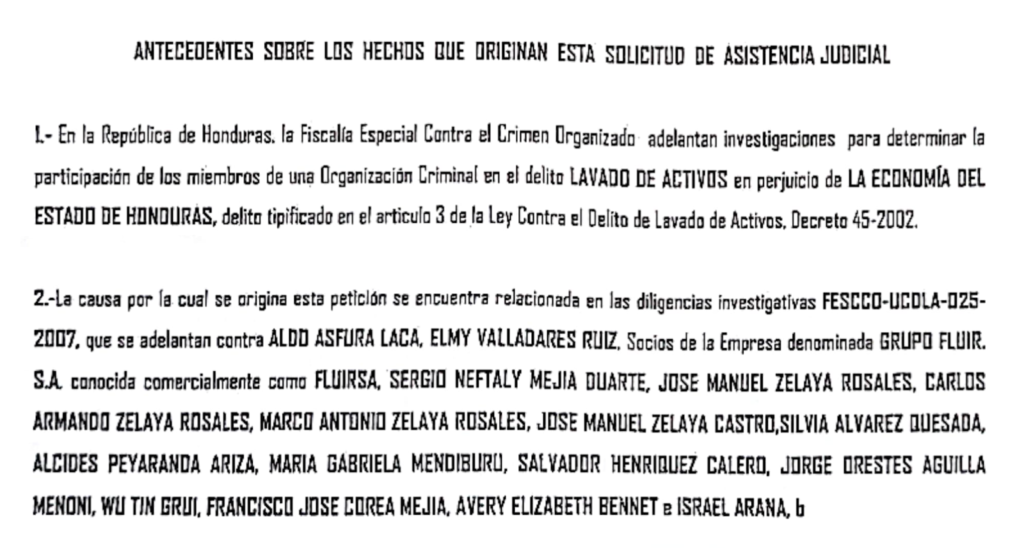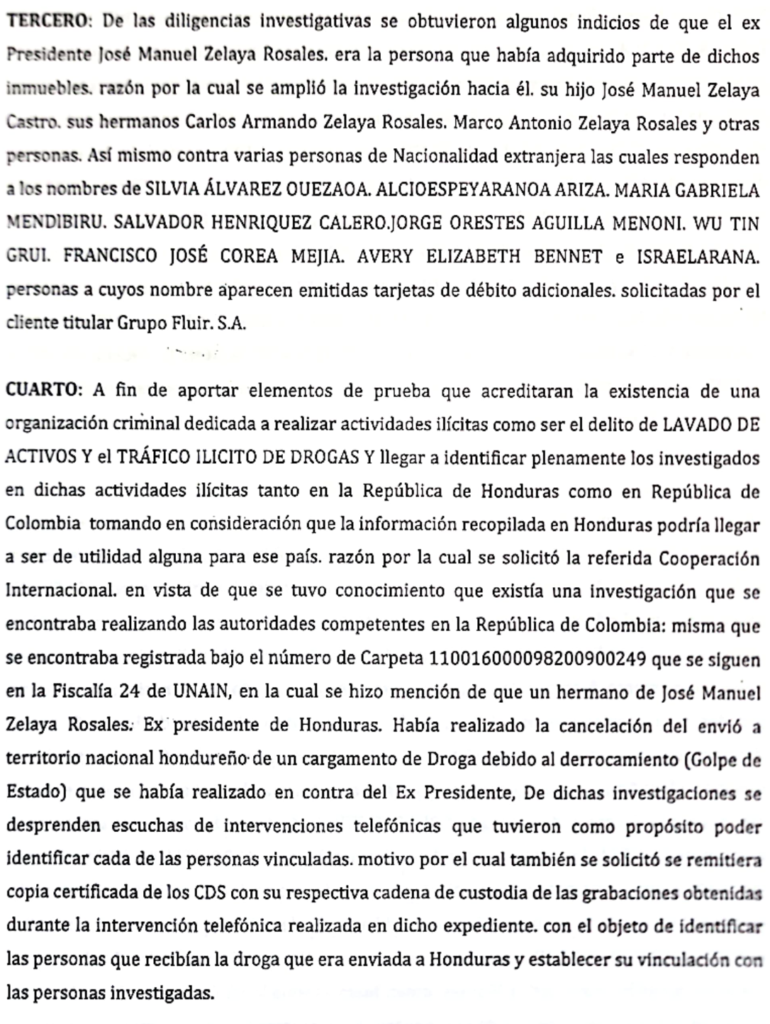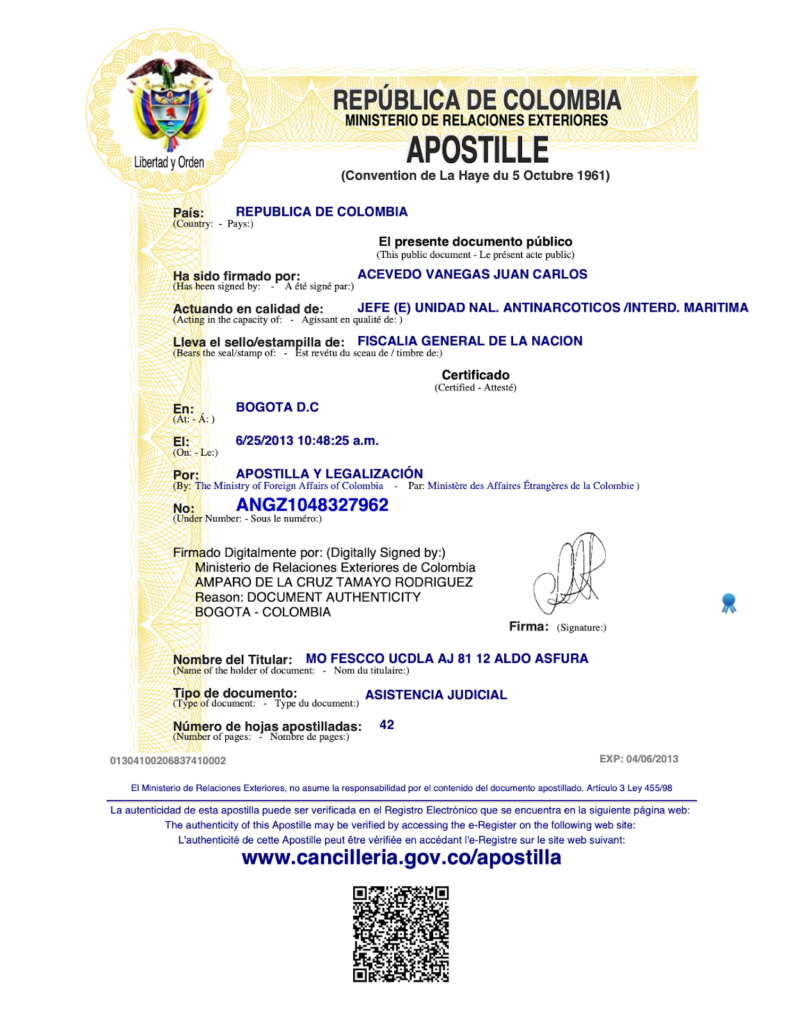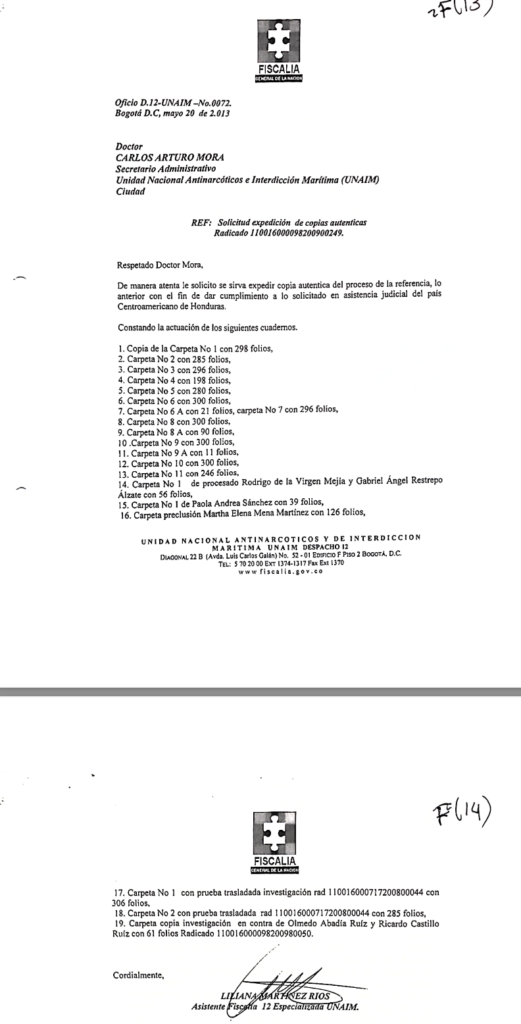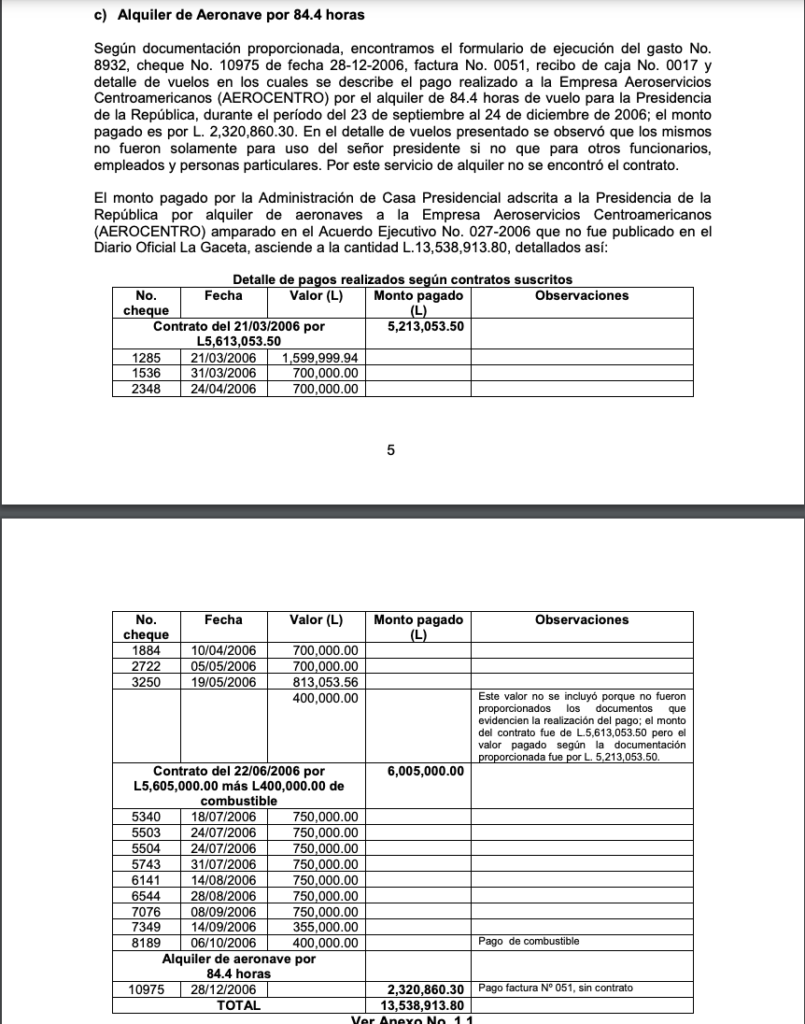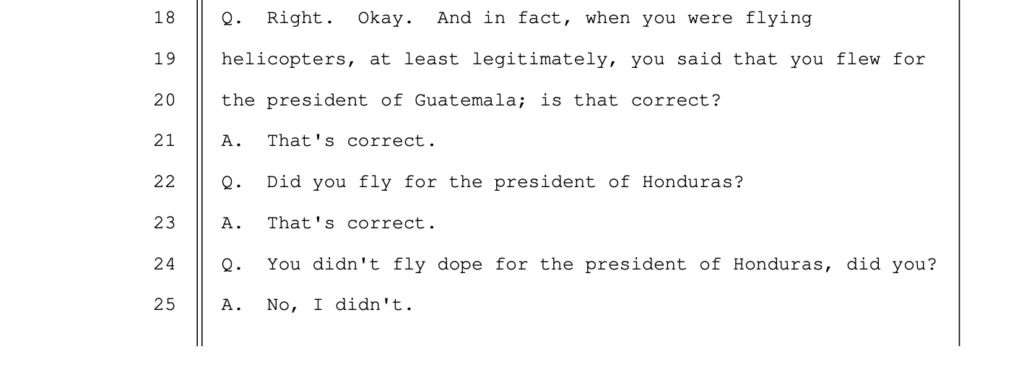A request for legal assistance sent to Colombian authorities in 2012 revealed that former President Manuel Zelaya Rosales and several of his relatives were under investigation for money laundering and drug trafficking. Colombia’s Attorney General’s Office provided Honduran authorities with telephone recordings that tie the Zelaya family to drug trafficking and the irregular acquisition of properties. To date no indictment has been filed and Honduran prosecutors have not made progress in the investigation.
Text: Contracorriente
In the context of a 2012 money laundering investigation against Grupo Fluir S.A. (Fluirsa), Honduras’ Attorney General’s Office requested its Colombian counterpart information about the Zelaya family’s alleged involvement in the irregular acquisition of properties and a drug trafficking operation alongside Marco Zelaya, brother of former president Zelaya.
Honduran prosecutors requested information about the former president, his brothers Marco Antonio and Carlos Armando, his son José Manuel, and others.
In 2010, in the aftermath of the coup that ousted Manuel Zelaya, Honduran news outlets reported the seizure of three properties located in Tegucigalpa, Valle de Ángeles, and Santa Lucía, central Honduras. According to the Directorate for the Fight Against Drug Trafficking (DLCN), back then, the properties belonged to Grupo Fluirsa, a company that was under investigation for money laundering activities. The asset forfeiture case was brought to the Public Prosecutor’s Office in the Santa Barbára department, where an estate was seized, in the municipality of Petoa, that was later linked to Manuel Zelaya during the investigation.
According to Fluirsa’s certificate of incorporation, dated April 27, 2006, its partners were Aldo Asfura Laca and Elmy Valladares Ruiz. The former is a businessman who was arrested by the Special Prosecutor’s Office Against Organized Crime (FESSCO) and DLCN in 2018 for money laundering charges. He was released a week later due to lack of evidence. The latter was the partner of Sergio Neftaly Mejía Duarte, a Honduran national convicted of drug trafficking in 2018 and sentenced to life in prison by the US District Court for the Southern District of Florida.
At the time, the Honduran Attorney General’s Office was headed by Luis Rubí. He was later charged with embezzling public funds and incompetence, which prompted his resignation in 2013. He was replaced by Óscar Chinchilla, who was accused of protecting drug traffickers with ties to former President Juan Orlando Hernández. The current attorney general, Johel Zelaya, promised to be unforgiving of those involved in corruption and drug trafficking, including members of the ruling party. He called on Carlos Zelaya to issue a statement to explain his participation in a 2013 meeting in which he discussed bribes with drug traffickers. However, the attorney general has not called on other members of the Zelaya family to issue statements.
Requests for comment to the Attorney General’s Office on the case and its follow-up went unanswered.
Colombian Attorney General’s Office handed over recordings that tie the Zelaya family with illegal businesses
Luis Rubí had also requested information on Aldo Asfura Laca, Elmy Valladares, and Sergio Neftaly Mejía – Fluirsa’s business partners.
Former President Zelaya acquired some of the properties that had been seized from Fluirsa, and one of his brothers made a call to cancel a drug shipment to Honduras prior to the 2009 coup, according to FESSCO.
Fluirsa’s business partners allegedly misappropriated properties in Tegucigalpa, Valle de Ángeles, and Santa Lucía, as well as a stud farm with a helipad and heads of cattle in Santa Bárbara. These were paid for in US dollars, authorities say, and were linked to individuals under investigation for money laundering, according to prosecutors. According to an official document to which Contracorriente had access, as of May 2024, three of the properties seized in central Honduras were still in the hands of the Honduran government.
In the asset forfeiture request, the jury of Santa Bárbara stated that the property in Santa Lucía, Francisco Morazán department, was purchased from Enrique Ortez Sequeira – member of the Liberal Party who has had a close relationship with Manuel Zelaya – in March 2007. Sequeira was appointed as Honduras’ ambassador to the Food and Agriculture Organization of the United Nations (FAO) in May 2023.
Following the seizure of properties from Fluirsa, Rubí identified Manuel Zelaya as the likely owner of one of the properties, and decided to further investigate him, his two brothers, and one of his sons.
“A preliminary investigation suggested that former President José Manuel Zelaya acquired some of the properties which is why the investigation was broadened and included his son Jose Manuel Zelaya Castro, brothers Carlos Armando and Marco Antonio Zelaya Rosales, and other persons,” the document reads, without specifying how Manuel Zelaya came to own the properties.
According to the request for legal assistance, Honduran prosecutors asked Colombian authorities for telephone recordings of one of Manuel Zelaya’s brothers – later identified as Marco Zelaya – canceling a drug shipment to Honduras prior to the 2009 coup. The recordings would help Honduran prosecutors identify the persons receiving the drugs in Honduras and tie them to suspects, the document reads.
The documents accessed by Contracorriente indicate that the investigation against Marco Zelaya, which was carried out by the Colombian Attorney General’s Office, motivated the request for assistance from Honduran prosecutors. The objective was to “prove the existence of a criminal organization dedicated to illicit activities such as money laundering and drug trafficking,” in which the former president, his brothers, and his youngest son were allegedly involved.
“International assistance will be provided to judicial authorities of the Republic of Honduras, as requested. The aforementioned file will be duplicated in its entirety, and an investigator of the case will reproduce the CDs containing the recordings of the wiretaps,” responded the Colombian Attorney General’s Office in May 2013. At least 19 folders with hundreds of pages were sent to Honduran prosecutors. The response from Colombian authorities can be found on the Foreign Ministry’s website.
Contracorriente attempted to contact former President Zelaya and his son José Manuel to understand their version of events and to find out if they know about this case involving them, but requests for comment went unanswered, and the former president did not respond to questions sent to his mobile.
Judge authorized the expert analysis of the recordings but those implicated have not been held accountable
In 2017, four years after Colombian prosecutors sent CDs with recordings that could implicate Manuel Zelaya in a case of money laundering and drug trafficking, a FESCCO prosecutor requested a judge with national jurisdiction to process them and appoint an agent of the Technical Agency of Criminal Investigation (ATIC) to carry out the analysis.
Lisseth Vallecillo Banegas, a judge with national jurisdiction, was in charge of authorizing the swearing-in ceremony of the expert assigned to the case that gave way to the review of the recordings. Vallecillo Banegas was accused on several occasions of being part of the criminalization against environmental defenders in Tocoa who opposed the installation of a mine in Guapinol. She was also mentioned in a report of Honduras’ Superior Accounts Tribunal (TSC) for her alleged involvement in irregularities in the settlement of travel expenses during her administration. In addition, she is the sister of former judge Marco Vallecillo, who was charged with committing extortion crimes in August 2024.
In September 2017, an expert was assigned to listen and analyze the 15 CDs and 11 DVDs provided by Colombian authorities; however, the current status of the investigation is unknown. Contracorriente contacted some of the prosecutors, agents and judges mentioned in the legal assistance request, but they are not authorized to speak about the cases they have processed, they said.
More alleged ties between Manuel Zelaya and organized crime
According to the asset forfeiture request, Rene Alfonso “Foncho” Rodríguez Valle, Wilfredo Humberto Hernández Herrera, and María Antonieta Mejía Serrano were involved in money laundering activities.
Valle has been in the criminal scene for several years. In 2010, Marlene Banegas, then coordinator of the Attorney General’s Office, said that Valle had already been identified as one of the owners of the first property seized in Petoa, Santa Barbara. At the time, he was facing money laundering charges. Banegas, who was killed in 2014, also explained that Valle was identified as a front man as he could not justify the ownership of seized assets.
On October 27, 2023, a judge ruled in favor of returning Valle other assets (jewelry, $60,000 and several bank accounts), despite the fact that in the trial, when questioned by prosecutors, he failed to disassociate himself from drug trafficking activities with Hondurans who had been extradited to the US.
In that trial, a FESSCO prosecutor questioned Valle about alleged transactions made with former president Manuel Zelaya. He answered that they only shared an interest in horses, but he had never done business with him.
The prosecutor inquired about this because, according to an investigation by DLCN, between 2008 and 2009, Manuel Zelaya bought a property in Palos Blancos, Santa Barbara, for $8 million, where military planes allegedly landed and officials of his government arrived, although the property has always been registered to Valle, “front man” of the former president. Valle’s defense attorney said that mentioning Zelaya in the case is a form of “political persecution.” No direct transaction between Valle and the former president was found in this process.
When asked by prosecutors about the origin of his assets – properties, bank accounts, jewelry – Valle said that he is a cattle rancher and businessman who sells land.
Manuel Zelaya and Otto Pérez Molina’s trusted pilot
In January 2007, Valle founded the company Helicópteros Turísticos S.A., along with with Guatemalan pilot Guillermo Abraham Lozano Bahuer, who flew for drug traffickers in 2004: for Los Lorenzana in Guatemala and for the Cachiros and the Valle Valle brothers in Honduras.
Between 2007 and 2009, Bahuer transported about 6,000 kilograms of cocaine by helicopter from the Honduran Moskitia to San Esteban in the Olancho department and San Pedro Sula in the Cortés department on behalf of Sergio Neftalí Mejía, according to Bahuer’s testimony in the trial against Mejía.
During an audit of the Presidential House between 2006 and 2009, the Superior Accounts Tribunal highlighted a series of irregularities in payments made for the lease of aircraft to transport then president Manuel Zelaya. One of the payees was Empresa Aeroservicios Centroamericanos (Aerocentro), which was represented by Bahuer.
In the report, the tribunal pointed out the payment of more than 2 million lempiras (about $40,000) to Aerocentro between September and December 2006. Flights were not only made for Manuel Zelaya, but also for other officials, employees, and private individuals. No contract for the rental service could be found.
In 2010, DLCN linked that company to drug trafficking activities. A helicopter, which had traces of drugs, was seized in La Moskitia, eastern Honduras. Authorities found possible links between this operation and the Sinaloa Cartel in Mexico. In 2012, these findings led to the arrest of two pilots of the company: Haward Suhr, one of Bahuer’s partners in Aerocentro, and Juan Luis González, a former Guatemalan congressman. In December 2013, both were acquitted by a sentencing court in San Pedro Sula.
Guatemalan news outlet El Periodico revealed that Bahuer was a trusted pilot of the Zelaya family in Honduras, so much so that after the 2009 coup, he transported Manuel Zelaya and his family to Guatemala, and then flew the former president back to Honduras without triggering international radar detection.
Bahuer testified before a judge in the US District Court for the Southern District of Florida that he had flown for former President Zelaya, although he denied transporting drugs for him.
In 2007, Bahuer began collaborating with the Drug Enforcement Administration (DEA), and told Judge Michael Moore of the Southern District Court of Florida in 2018 that he negotiated a $30 million bribe with executives of Terminal de Contenedores de Barcelona (TCB) in exchange for granting them the usufruct of a plot of land to operate a private port terminal. During this time, he was flying for another Central American president at the time: Otto Pérez Molina from Guatemala. Bahuer and Molina were charged by the Guatemalan Attorney General’s Office and the International Commission Against Impunity in Guatemala (CICIG) for accepting bribes in 2016.
Holding Hondurans accountable for trafficking drugs
Some of the individuals mentioned in the request for legal assistance have been brought to justice. Sergio Neftaly Mejía was sentenced to life in prison by a US court in 2018. Of the Montes-Bobadilla family, only Juan Carlos Montes-Bobadilla remains at large. The US has offered a $5 million reward for information that leads to his arrest.
The document also links, without stating the reasons, Elmy Valladares (a partner of Fluirsa) with Pedro Garcia Montes, who belonged to the Montes-Bobadilla clan, a family dedicated to coca cultivation and cocaine trafficking in the department of Colon. This family worked closely with the Cachiros and Valle Valle family. Montes, who initially resided in Colombia and introduced the family to drug trafficking, was murdered in that country in 2004.
Multiple assets were seized from Valladares after the sentencing of Sergio Neftaly Mejia, including a private social club and apartments in La Ceiba, northern Honduras, and a hotel in Moskitia, department of Gracias a Dios.
But this was not the only time that Elmy Valladares and Aldo Asfura, partners of Fluirsa, participated in the acquisition and sale of illicit assets.
In March 2009, Asfura sold one of his properties in Tegucigalpa, in the Florencia neighborhood – where the headquarters of the Necaxa sports club was located at the time, according to media reports – to Horizontes Turísticos de Honduras S.A. de C.V., a company in which he himself was listed as legal representative since 2006 and which had an almost identical name with Horizontes Turísticos de Honduras S. de R.L., another company formed by Elmy Valladares, Sergio Neftaly Mejia and Claudia Patricia Hernández.
The investigation by Honduran prosecutors against the Zelaya family, who had connections with Fluirsa, is yet another indication of the presidential family’s ties to organized crime. On September 3, Insight Crime published a video showing Carlos Zelaya – brother of former President Manuel Zelaya, former secretary of the National Assembly and Libre Party leader – meeting with Tocoa Mayor Adán Funez and drug traffickers Ramón Matta Waldurraga and the Rivera Maradiaga brothers, better known as the Cachiros. This provoked unprecedented political turmoil in Honduras, although so far there have been no conclusive actions by the Honduran justice system to indict them.
Recommended reading: Perfect timing by the Zelaya family
This investigation was carried out with support from the Consortium to Support Independent Journalism in Latin America (CAPIR), which is led by the Institute of War and Peace Reporting (IWPR).

